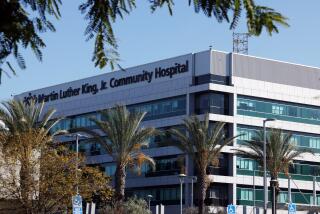House Panel Probes Hospitals’ Tax-Exempt Status
- Share via
WASHINGTON — When actress Elizabeth Taylor once was rolled through Houston’s luxuriously appointed Methodist Hospital aboard a gurney, she asked: “Is this a hotel?”
It was an understandable question, considering that Methodist, one of the nation’s largest tax-exempt hospitals, offers such amenities as valet parking, bellhops and a 24-hour concierge who, the hospital guidebook advises, “can answer questions about dining, shopping, cultural activities.” Its elegant restaurant, Chez Eddy, features sauteed prawns, poached Norwegian salmon and ricotta cheesecake.
Generous federal, state and local tax breaks have made it possible for Methodist to offer all this and more and still accumulate more than $600 million in cash reserves. Nevertheless, the not-for-profit hospital turns away uninsured patients who cannot come up with a cash deposit to cover the cost of their care or patients who belong to health maintenance organizations.
Meanwhile, nearby neighborhoods are suffering an infant mortality rate rivaling those of some Third World countries and emergency rooms in adjacent hospitals are so jammed that seriously ill patients must wait in hallways for a bed.
With an eye toward President Clinton’s upcoming health care reform plan, a House subcommittee Wednesday examined how the nation’s current health care system allows--and even encourages--such disparities.
“You can’t take away the joys and prerogatives of being rich, but you can address the inadequacies of care for the poor,” said Rep. John D. Dingell (D-Mich.), chairman of the investigations subcommittee of the House Energy and Commerce Committee.
Texas Atty. Gen. Dan Morales sued Methodist in 1990, arguing that its tax-exempt, charitable designation--which gives it a tax benefit worth about $36 million a year--also carries a responsibility to provide health care for those who have no means of paying for it. The state lost, Assistant Atty. Gen. Ann Kitchen told the panel, in part because a judge accepted the hospital’s reasoning that providing health care for anyone is a charitable endeavor. The attorney general is appealing.
“In my view, it is a charitable purpose to provide care to a rich man or a poor man,” hospital President Larry L. Mathis, who is also chairman of the American Hospital Assn., argued in a deposition.
While Methodist’s case is extreme, it is far from unusual, Nancy Kane, a Harvard University expert on hospital management, told the subcommittee. She noted that as one tax-exempt medical center in West Virginia was asking for a rate increase and decreasing its budget for charity care, it was diversifying into landscaping, hotels, bars and debt-collection agencies.
The federal tax code, which gives charitable hospitals a tax-free designation, leaves the issue of whether and how much free care they provide to the administrators of the hospitals themselves.
“We did not create the rules for this tax-exempt status; we abide by the rules set for us,” Mathis said. “If society decides we must change our mission to retain this status, we will abide by those rules. But the possibility of such change is no reason for accusing us of past ‘misdeeds’ based on standards that have not, to this day, been articulated or enacted.”
Outside the hearing, Mathis told reporters that that real answer to the problem is straightforward--”a system that covers everybody.”
More to Read
Sign up for Essential California
The most important California stories and recommendations in your inbox every morning.
You may occasionally receive promotional content from the Los Angeles Times.













